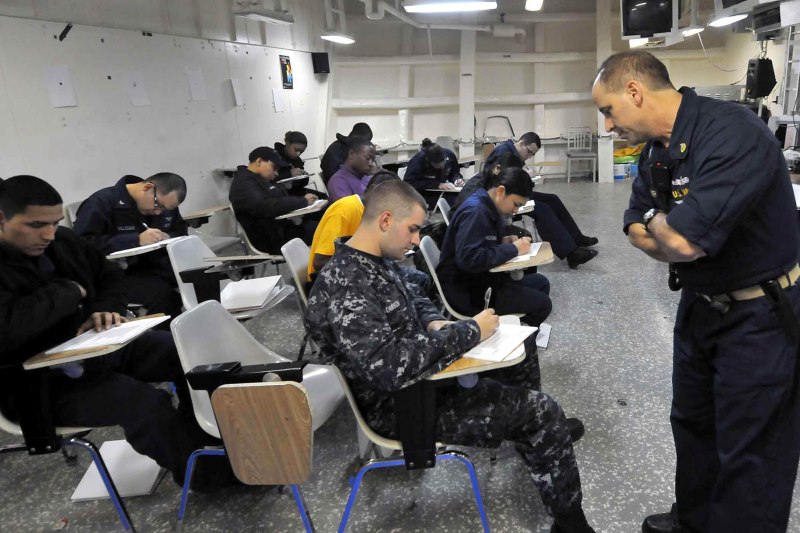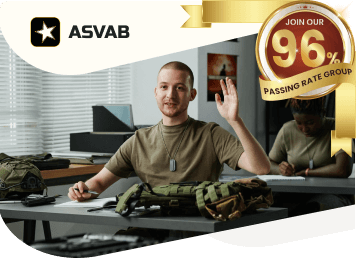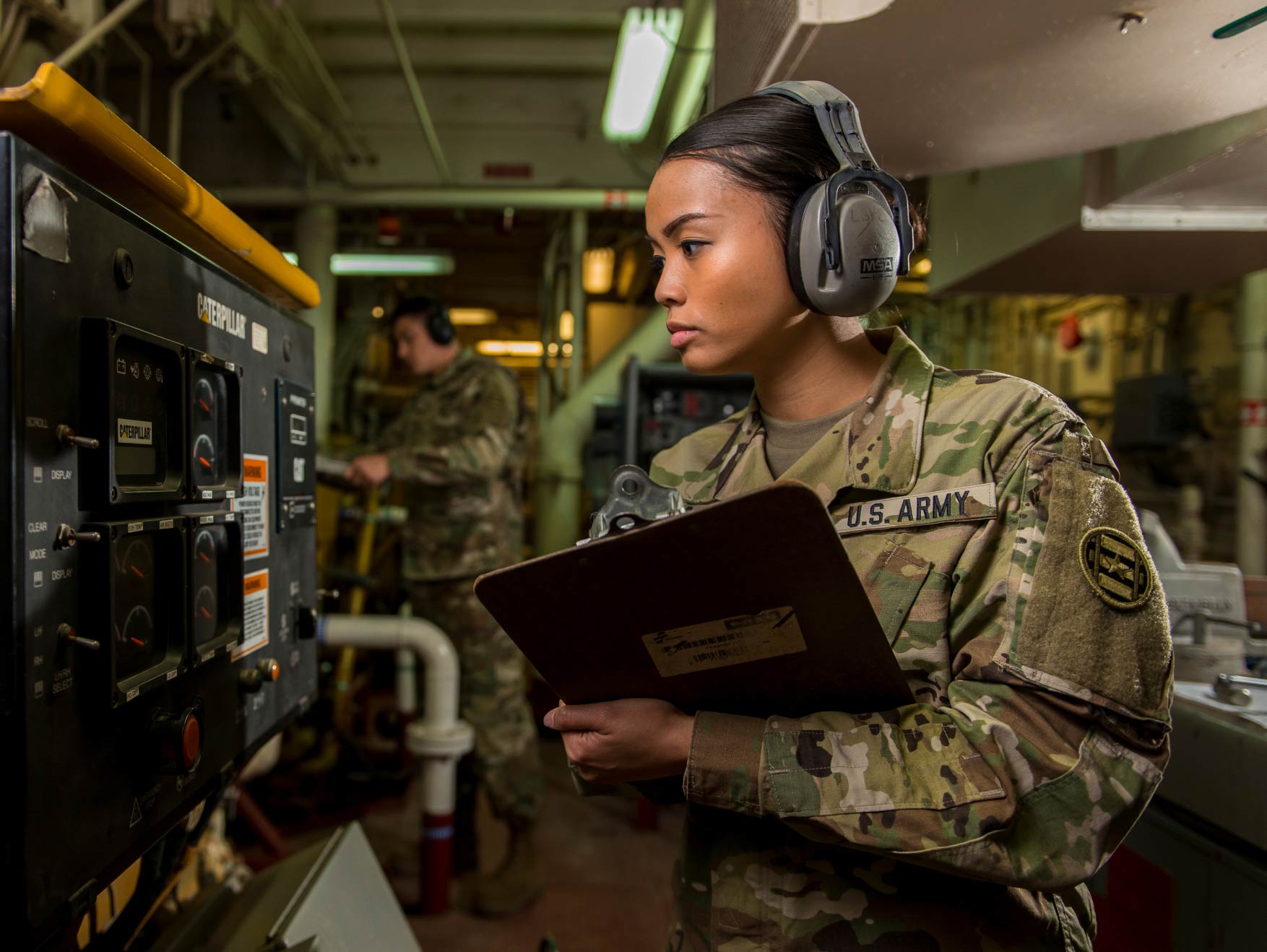Are you stressed about taking the ASVAB? Afraid of missing out on military enlistment if getting poor ASVAB scores, but don’t know how to study for it? Don’t worry. We are here to make studying simpler and more enjoyable for you.
In this post, we provide you with the easiest and most comprehensive ASVAB study guide, covering all you need to know about how and what to study. With a clear and detailed guide on each subtest, you definitely can become confident in taking the test and getting your desired score. Scroll down right now!
How to study for the ASVAB?
To effectively study for the ASVAB, you need a structured approach that begins with understanding where you currently stand. By the ground of your starting level, a study plan and strategy will be built to fit your skills and goals.

Let’s break the detailed guide on how to study for the ASVAB:
Assessing Your Current Knowledge and Skills
Before diving into how to study, the first important step is to assess your current level. By knowing where you stand, you can set a realistic goal and develop a clear and effective study direction. Here are some steps you can follow to assess your current knowledge and skills:
- Do a diagnostic test: This will give you a realistic score for your current level.
- Identify strengths and weaknesses: Use diagnostic results to identify areas you need to improve.
- Set target: Based on your level and goals, set target scores for each subtest to guide your study efforts. Set both short and long-term targets to keep track more effectively.
Creating a study plan
After pointing out your level and target, you need to draw a plan to follow. A well-structured study plan is like a map for successful preparation. Here are some recommendations when making a study plan:
- Set daily study time: Establish a specific time each day for studying to build a strong study routine. By dedicating consistent time slots to your ASVAB preparation, you can create positive study habits, making it easier to stay on track and cover all necessary knowledge.
- Arrange time for each skill and subtest: Allocate time for each skill and subtest based on your diagnostic results. Spend more time on weaker areas while maintaining strength in others.
- Calculate enough study time before test day: Make sure your study schedule allows you to comprehensively review and practice before your test date. By having enough time, you can reduce last-minute cramming, and boost your confidence as test day approaches.
Developing a study strategy
Once you have your plan in place, developing an effective study strategy is the next crucial step in your ASVAB study. Here’s what you need to consider to create a study strategy that works:
- Develop a tailored approach for each subtest: Each assesses different skills and knowledge areas. A one-size-fits-all strategy won’t cut it. Instead, you need to break down your study approach into specific strategies for each subtest. This means dedicating time to understanding the unique demands of each section, whether it’s mastering technical concepts for Electronics Information or brushing up on language skills for Word Knowledge.
- Identify and focus on weak areas: Everyone has strengths and weaknesses, and your study strategy should reflect that. While it’s important to maintain your strengths, real progress comes from improving your weaker areas.
- Customize your study methods: Your study strategy should align with how you learn best. Whether you’re a visual learner who benefits from diagrams and videos, an auditory learner who prefers listening to explanations, or a kinesthetic learner who needs hands-on practice, tailoring your study methods to suit your learning style can make a significant difference in your retention and understanding.
To learn more detailed strategies, you can read our post on strategies to score high on the ASVAB.
Practicing sample tests
Practice makes perfect, and this is especially true for the ASVAB. All the planning and strategizing will only pay off if you put them into action. Let’s look at how you can use practice tests to your advantage:
- Familiar with the test structure: By regularly taking these tests, you’ll become comfortable with the way questions are presented, helping to reduce anxiety on test day and allowing you to manage your time effectively.
- Review mistakes: After completing each practice test, take the time to thoroughly analyze your results. Look for patterns in the mistakes you make—are there certain question types or topics that consistently trip you up? Use this insight to adjust your study plan, focusing more on the areas where you need improvement.
Our Free ASVAB practice tests are one of the best reliable materials for you to practice. Our practice tests are designed to closely mimic the real test format, providing you with reliable and accurate preparation material. Give it a try!
What to study for the ASVAB?
Understanding what to study is a key guide to help you stay on the right path. There are four domains you need to focus on, including verbal, math, science/technical, and spatial. The ASVAB measures participants’ skills and knowledge in these four domains through nine subtests below (with AI and SI subtests combined into AS scores in CAT-ASVAB, and a single subtest in P&P-ASVAB). Let’s dive into what each subtest entails and the key knowledge you should focus on:
| ASVAB Subtests | Description | Domain |
|---|---|---|
| General Science (GS) | Assessing basic understanding of physical and biological sciences. | Science/Technical |
| Arithmetic Reasoning (AR) | Solving practical math problems. | Math |
| Word Knowledge (WK) | Measuring understanding of word meanings. | Verbal |
| Paragraph Comprehension (PC) | Extracting information from written passages. | Verbal |
| Mathematics Knowledge (MK) | Testing knowledge of higher-level math concepts. | Mathe |
| Electronics Information (EI) | Testing basic principles of electricity and electronics. | Science/Technical |
| *Auto Information (AI) | Understanding of automotive systems and repairs. | Science/Technical |
| *Shop Information (SI) | Knowledge of tools and workshop practices. | Science/Technical |
| Mechanical Comprehension (MC) | Measuring understanding of mechanical and physical principles. | Science/Technical |
| Assembling Objects (AO) | Testing ability to assemble separate components. | Spatial |
General Science (GS)
The General Science subtest measures your knowledge of physical and biological sciences. Here’s what you need to study:
- Biology: Cell structure, genetics, and basic anatomy.
- Chemistry: Atomic structure, chemical reactions, and the periodic table.
- Physics: Newton’s laws, energy, and simple machines.
- Environmental science: Ecosystems, weather patterns, and conservation.
To learn more about the detailed knowledge covered in the GS subtest and how to study, check out the post on the General Science ASVAB study guide and practice tests.
Arithmetic Reasoning (AR)
The Arithmetic Reasoning domain belongs to math, assessing your ability to solve arithmetic word problems. To excel in this domain, focus on mastering the following areas:
- Basic arithmetic: Sharpen your skills in addition, subtraction, multiplication, and division.
- Percentages & Ratios: Get comfortable with calculations involving proportions, percentages, and comparisons.
- Word problems: Practice solving real-world math problems.
- Manual calculation: Please note that calculators aren’t allowed during the ASVAB, so it’s crucial to practice solving these problems by hand. Strengthening your mental math will give you a significant edge.
If you want to learn more strategies and practice tests to study the AS subtest, you can read our post on the Arithmetic Reasoning ASVAB study guide.
Word Knowledge (WK)
Your vocabulary and understanding of word meanings in context are crucial for success in the Word Knowledge subtest. Here is what you should focus on:
- Vocabulary: Learn new words and their meanings.
- Word roots, prefixes, and suffixes: Understanding these can help you deduce the meaning of unfamiliar words. For example, knowing that “pre-” means “before” can help you figure out words like “predict” or “precede.”
- Context clues: Practice understanding the meaning of words based on their usage in sentences.
For more targeted strategies to improve your Word Knowledge, check out our comprehensive Word Knowledge ASVAB study guide and practice.
Paragraph Comprehension (PC)
This subtest evaluates your ability to extract and understand information from written passages. Here is what to study:
- Reading comprehension: Practice reading a variety of texts and answering related questions.
- Main ideas & details: Focus on identifying the main points of each paragraph and recognizing the details that support those points.
- Inferences: Improve your ability to make logical conclusions based on the information presented in the text.
For more study strategies and practice, read our post on the Paragraph Comprehensive ASVAB study guide.
Mathematics Knowledge (MK)
Mathematics Knowledge covers high school-level math concepts. Here’s what you should review:
- Algebra: Work on solving equations, manipulating variables, and understanding functions.
- Geometry: Review shapes, angles, areas, and volumes. Geometry questions often test your ability to apply these concepts to solve problems.
- Mathematical concepts: Brush up on the properties of numbers, factorization, and various mathematical operations. A solid understanding of these basics will serve you well.
For more details, you can read the Mathematics Knowledge study guide.
Electronics Information (EI)
In this subtest, your understanding of electrical principles is put to the test. Focus on:
- Circuits: Understanding how different types of circuits function, including series and parallel circuits.
- Currents & Voltage: Learn the relationship between current, voltage, and resistance.
- Resistors & Capacitors: Understand the roles these components play in regulating current and storing charge in circuits.
Read our Electronic Information ASVAB study guide for detailed study strategies and practice.
Auto and Shop Information (AS)
This subtest assesses your knowledge of automotive systems and shop practices. Here is what to review:
- Automotive systems: Gain a basic understanding of how engines, transmissions, and braking systems work.
- Shop tools: Familiarize yourself with common hand and power tools used in woodworking and metalworking. Knowing what each tool does is crucial.
- Repair techniques: Learn about basic repair methods for common issues, whether in cars or during shop work.
For more detailed study strategies and practice tests, follow our Auto and Shop Information study guide.
Mechanical Comprehension (MC)
This subtest measures your understanding of mechanical and physical principles. To prepare, focus on:
- Force & Motion: Study Newton’s laws of motion and how forces interact in different scenarios.
- Friction: Understand how friction impacts movement and efficiency, which is key in many mechanical systems.
- Simple machines: Learn about the function and application of simple machines like levers, pulleys, and gears.
Read our Mechanical Comprehension ASVAB study guide for more understanding.
Assembling Objects (AO)
This subtest measures your spatial abilities. Improve your skills on AO by focusing on:
- Spatial orientation: Practice visualizing and mentally rotating shapes to understand how they fit together.
- Puzzle practice: Work on exercises that involve matching and assembling objects, such as jigsaw puzzles or 3D model kits. This practice can enhance your ability to visualize and manipulate objects in space.
For more details, you can read our Assembling Objects ASVAB study guide.
Study for ASVAB test: Tips & tricks

Beyond understanding how and what to study, there are several tips and tricks that can help you maximize your efficiency and score:
- Stay consistent: Consistency is key when studying for the ASVAB. Set a specified time every day for learning. The steady, daily effort will build your knowledge and confidence over time.
- Change study environment: A change of scenery can do wonders for your motivation and concentration. If you find yourself losing focus, try studying in a new location. Whether it’s a quiet corner of a library, a coffee shop, or even a park, changing your environment can refresh your mind and keep you engaged.
- Stay healthy: Studying for the ASVAB isn’t a sprint; it’s a marathon. Make sure you are taking care of your physical and mental health during this period. Eat balanced meals, get enough sleep, and exercise regularly. Slow and steady wins the race – pace yourself, and avoid burnout.
- Accept your mistakes: Making mistakes is a normal part of the learning process. Don’t be discouraged by errors; instead, use them as opportunities to improve. After each practice test, review your mistakes carefully and understand where you went wrong. Keep practicing and stay persistent, knowing that each mistake brings you closer to mastering the material.
- Make a self-improvement commitment: Committing yourself can be a powerful motivator. Write down your goals, post them where you can see them every day, and remind yourself why you are doing this.
- Don’t stress: It’s natural to feel a bit of anxiety before such an important test but try not to let stress overwhelm you. Remember, with our study guide designed to be easy even for dummies, you have all the tools you need to succeed. Trust in your preparation and the work you have put in. With determination and the right approach, you can achieve the ASVAB score you desire.
FAQs
1. Can you study for the ASVAB?
Absolutely! Everyone has the potential to learn and pass the ASVAB if having the right approach. This ASVAB study guide for dummies is designed to simplify the learning process, making it easier for you to grasp the necessary concepts and excel on test day.
2. How long should I study for ASVAB?
The amount of time you should dedicate to studying varies from person to person, but a general recommendation is to start at least two months before your test date. This gives you ample time to cover all the necessary material, practice, and review without feeling rushed.
3. What is the best way to study for ASVAB?
The best approach to studying for the ASVAB includes
- Knowing your current skill level
- Understanding the test structure
- Creating a personalized study plan
- Developing effective strategies
- Consistently practicing.
For a detailed guide, be sure to read our ASVAB study guide carefully.
4. What should I focus on in the ASVAB?
Your focus should be tailored to these areas
- Your strengths and the requirements of your desired military position.
- The subtests that contribute to your AFQT score.
- Areas where you feel less confident.
A targeted study plan can help you hone in on these key sections and improve your overall performance.
ASVAB study guide: Take action
Studying for the ASVAB is a journey that requires dedication, but with the right resources and strategies, success is within your reach without much effort. Now that you have a clear understanding of how to study, it’s time to take action. Start by taking a mock test, creating a study plan, and diving into practice tests. Don’t forget to take advantage of our free study resources. Remember, this is not just about passing the test, it is the key to opening the door to your future in the military. Stay focused, and motivated, and you’ll achieve the score you need to reach your goals. Good luck on your journey to ace the ASVAB.




